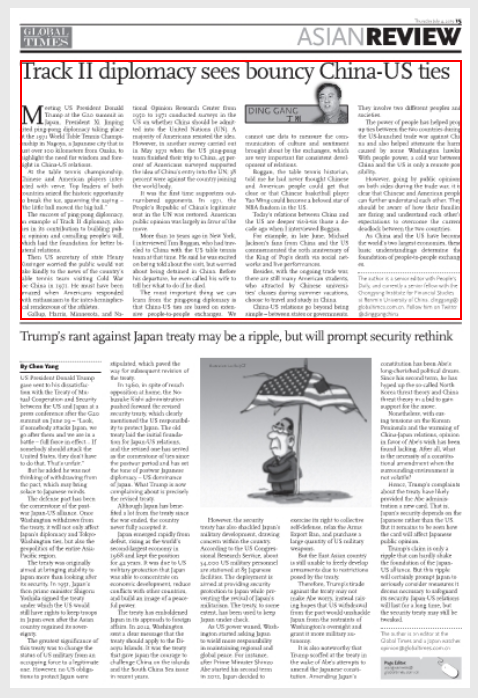Major Power Relations
Your Present Location: PROGRAMS> Major Power RelationsDing Gang: Track II diplomacy sees bouncy China-US ties
By Ding Gang Source: Global Times Published: 2019-7-3
Meeting US President Donald Trump at the G20 summit in Japan, President Xi Jinping cited ping-pong diplomacy taking place at the 1971 World Table Tennis Championship in Nagoya, a Japanese city that is just over 100 kilometers from Osaka, to highlight the need for wisdom and foresight in China-US relations.

At the table tennis championship, Chinese and American players interacted with verve. Top leaders of both countries seized the historic opportunity to break the ice, spawning the saying - "the little ball moved the big ball."
The success of ping-pong diplomacy, an example of Track II diplomacy, also lies in its contribution to building public opinion and corralling people's will, which laid the foundation for better bilateral relations.
Then US secretary of state Henry Kissinger worried the public would not take kindly to the news of the country's table tennis team visiting Cold War foe China in 1971. He must have been amazed when Americans responded with enthusiasm to the inter-hemispherical rendezvous of the athletes.
Gallup, Harris, Minnesota, and National Opinion Research Center from 1950 to 1971 conducted surveys in the US on whether China should be admitted into the United Nations (UN). A majority of Americans resisted the idea. However, in another survey carried out in May 1971 when the US ping-pong team finished their trip to China, 45 percent of Americans surveyed supported the idea of China's entry into the UN; 38 percent were against the country joining the world body.
It was the first time supporters outnumbered opponents. In 1971, the People's Republic of China's legitimate seat in the UN was restored. American public opinion was largely in favor of the move.
More than 10 years ago in New York, I interviewed Tim Boggan, who had traveled to China with the US table tennis team at that time. He said he was excited on being told about the visit, but worried about being detained in China. Before his departure, he even called his wife to tell her what to do if he died.
The most important thing we can learn from the ping-pong diplomacy is that China-US ties are based on extensive people-to-people exchanges. We cannot use data to measure the communication of culture and sentiment brought about by the exchanges, which are very important for consistent development of relations.
Boggan, the table tennis historian, told me he had never thought Chinese and American people could get that close or that Chinese basketball player Yao Ming could become a beloved star of NBA fandom in the US.
Today's relations between China and the US are deeper vis-à-vis those a decade ago when I interviewed Boggan.
For example, in late June, Michael Jackson's fans from China and the US commemorated the 10th anniversary of the King of Pop's death via social networks and live performances.
Besides, with the ongoing trade war, there are still many American students, who attracted by Chinese universities' classes during summer vacations, choose to travel and study in China.
China-US relations go beyond being simple - between states or governments. They involve two different peoples and societies.
The power of people has helped prop up ties between the two countries during the US-launched trade war against China and also helped attenuate the harm caused by some Washington hawks. With people power, a cold war between China and the US is only a remote possibility.
However, going by public opinions on both sides during the trade war, it is clear that Chinese and American people can further understand each other. They should be aware of how their families are faring and understand each other's expectations to overcome the current deadlock between the two countries.
As China and the US have become the world's two largest economies, these basic understandings determine the foundation of people-to-people exchanges.
The author is a senior editor with People's Daily, and currently a senior fellow with the Chongyang Institute for Financial Studies at Renmin University of China.























































































 京公网安备 11010802037854号
京公网安备 11010802037854号





